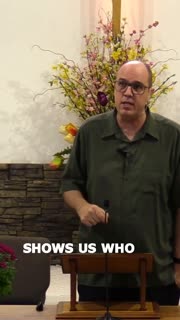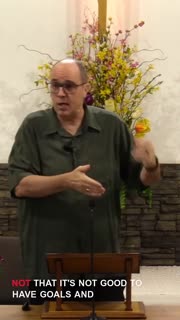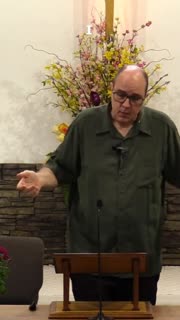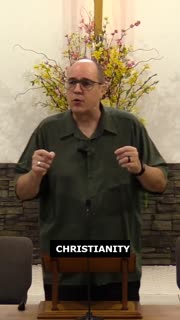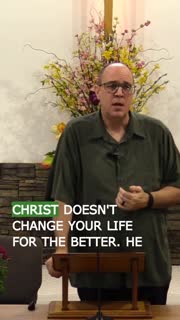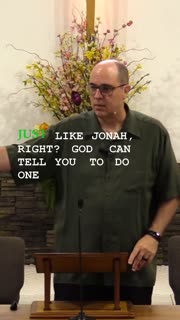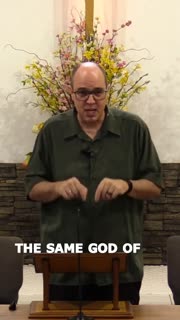Jonah's Journey: Trusting God Through Life's Storms
Summary
### Summary
In today's sermon, we delved into the story of Jonah and his attempt to flee from God's command to preach repentance to the people of Nineveh. Jonah's reluctance stemmed from his fear and anger towards the Assyrians, who were known for their wickedness and brutality. These emotions led him to run away from God's directive, boarding a ship to Tarshish instead. However, a violent storm sent by God revealed the true nature of Jonah's disobedience and the sailors' misplaced faith in their own gods.
The storm served as a metaphor for the trials we face in life, exposing our true selves and the objects of our trust. The sailors, initially polytheistic, turned to Jonah's God in desperation, highlighting how crises can lead us to seek the true God. Jonah's willingness to be thrown overboard to calm the storm mirrors the ultimate sacrifice of Jesus Christ, who gave His life for our salvation. This act of self-sacrifice is a cornerstone of the Christian faith, urging us to prioritize God's will over our own desires.
The sermon concluded with a call to recognize the everyday moments where God is calling us back to Him, emphasizing that our relationship with God should be based on unconditional trust and obedience, not on conditional bargains. The story of Jonah serves as a powerful reminder that God is always present, ready to rescue us from our wayward paths and lead us back to His purpose.
### Key Takeaways
1. The Storms of Life Reveal Our True Selves: Just as the storm revealed Jonah's disobedience and the sailors' misplaced faith, the trials we face in life expose our true character and the objects of our trust. These moments are opportunities to turn back to God and reaffirm our faith in Him. [07:01]
2. Misplaced Faith in False Gods: The sailors' initial reliance on their own gods, which failed them in the storm, mirrors how we often place our trust in worldly things like careers, family, or achievements. When these fail, it becomes evident that only the true God can provide lasting security and peace. [10:17]
3. Conditional Faith vs. Unconditional Trust: Many of us, like the sailors, turn to God only when our own efforts fail, often with conditions attached. True faith, however, requires unconditional trust in God, regardless of our circumstances or outcomes. [13:31]
4. The Willing Sacrifice: Jonah's willingness to be thrown overboard to save the sailors is a precursor to the ultimate sacrifice of Jesus Christ. This act of selflessness is a fundamental aspect of Christian faith, urging us to prioritize God's will and the well-being of others over our own desires. [18:37]
5. God's Persistent Call: Despite our attempts to run away or do things our own way, God continually calls us back to Him. Like Jonah, we may face storms and challenges, but these are often God's way of rescuing us and redirecting us towards His purpose. [27:42]
### YouTube Chapters
[0:00] - Welcome
[01:38] - Jonah's Disobedience
[03:17] - The Storm and the Sailors' Fear
[05:06] - Jonah's Deep Sleep
[07:01] - The Storm Reveals True Selves
[08:44] - Misplaced Faith in False Gods
[10:17] - Modern-Day Idolatry
[12:03] - Desperation and Conditional Faith
[13:31] - True Faith Requires Unconditional Trust
[15:11] - The Willing Sacrifice
[16:57] - The Sailors' Fear and Realization
[18:37] - Jonah's Willingness to Sacrifice
[20:31] - The Ultimate Sacrifice of Jesus
[22:19] - Historical Examples of Sacrifice
[24:08] - The Sailors' Encounter with God
[25:56] - Living a Life of Sacrifice
[27:42] - God's Persistent Call
Study Guide
### Bible Study Discussion Guide
#### Bible Reading
- Jonah 1:1-17 (NIV)
- Matthew 12:39-41 (NIV)
- Psalm 130:4 (NIV)
#### Observation Questions
1. What were the two main emotions that drove Jonah to flee from God's command? ([07:01])
2. How did the sailors initially respond to the storm, and what did they do when their own gods failed them? ([08:44])
3. What was Jonah's response when the sailors asked him what they should do to calm the storm? ([03:17])
4. How did the sailors' perception of God change from the beginning to the end of the storm? ([16:57])
#### Interpretation Questions
1. Why do you think Jonah was so reluctant to go to Nineveh despite God's clear command? ([01:38])
2. How does the sailors' shift from polytheism to calling on Jonah's God reflect our own tendencies in times of crisis? ([08:44])
3. What does Jonah's willingness to be thrown overboard reveal about his state of mind and his relationship with God? ([18:37])
4. How does the story of Jonah foreshadow the ultimate sacrifice of Jesus Christ? ([20:31])
#### Application Questions
1. Reflect on a time when you faced a "storm" in your life. How did it reveal your true character and the objects of your trust? ([07:01])
2. Have you ever placed your faith in "false gods" like career, family, or achievements? How did these fail you in times of crisis? ([10:17])
3. Do you find yourself turning to God only when your own efforts fail? How can you cultivate unconditional trust in God, regardless of circumstances? ([13:31])
4. Jonah was willing to sacrifice himself to save the sailors. In what ways can you prioritize God's will and the well-being of others over your own desires? ([18:37])
5. How do you recognize God's persistent call in your everyday life? What steps can you take to respond to His call more faithfully? ([27:42])
6. Think of a situation where you might need to make a personal sacrifice for the benefit of others. How can you prepare yourself to act selflessly in that situation? ([22:19])
7. How can you ensure that your relationship with God is based on unconditional trust and obedience, rather than conditional bargains? ([15:11])
Devotional
Day 1: The Storms of Life Reveal Our True Selves
Description: The trials and storms we face in life often serve as mirrors, reflecting our true character and the objects of our trust. Just as the violent storm revealed Jonah's disobedience and the sailors' misplaced faith in their own gods, our personal storms expose where we place our trust. These moments of crisis are opportunities to turn back to God and reaffirm our faith in Him. When we face difficulties, it is crucial to examine our responses and recognize whether we are relying on worldly things or on God. [07:01]
Jonah 1:4-5 (ESV): "But the Lord hurled a great wind upon the sea, and there was a mighty tempest on the sea, so that the ship threatened to break up. Then the mariners were afraid, and each cried out to his god. And they hurled the cargo that was in the ship into the sea to lighten it for them. But Jonah had gone down into the inner part of the ship and had lain down and was fast asleep."
Reflection: Think about a recent trial or storm you have faced. What did it reveal about where you place your trust? How can you turn back to God in this area today?
Day 2: Misplaced Faith in False Gods
Description: The sailors' initial reliance on their own gods, which failed them in the storm, mirrors how we often place our trust in worldly things like careers, family, or achievements. When these fail, it becomes evident that only the true God can provide lasting security and peace. This realization can be a turning point, leading us to seek the true God who is always faithful and dependable. It is important to identify the false gods in our lives and shift our trust to the one true God. [10:17]
Jeremiah 10:5 (ESV): "Their idols are like scarecrows in a cucumber field, and they cannot speak; they have to be carried, for they cannot walk. Do not be afraid of them, for they cannot do evil, neither is it in them to do good."
Reflection: Identify one "false god" or worldly thing you have been relying on for security or peace. How can you begin to shift your trust to God in this area today?
Day 3: Conditional Faith vs. Unconditional Trust
Description: Many of us, like the sailors, turn to God only when our own efforts fail, often with conditions attached. True faith, however, requires unconditional trust in God, regardless of our circumstances or outcomes. This kind of faith is not based on what we can get from God but on a deep, unwavering trust in His character and promises. It challenges us to let go of our conditional bargains and fully surrender to God's will, trusting that He knows what is best for us. [13:31]
Proverbs 3:5-6 (ESV): "Trust in the Lord with all your heart, and do not lean on your own understanding. In all your ways acknowledge him, and he will make straight your paths."
Reflection: Reflect on a time when you placed conditions on your faith in God. What would it look like to trust Him unconditionally in that situation?
Day 4: The Willing Sacrifice
Description: Jonah's willingness to be thrown overboard to save the sailors is a precursor to the ultimate sacrifice of Jesus Christ. This act of selflessness is a fundamental aspect of Christian faith, urging us to prioritize God's will and the well-being of others over our own desires. It calls us to live sacrificially, putting the needs of others before our own and being willing to make personal sacrifices for the greater good. This kind of sacrificial love is a powerful testimony of our faith in action. [18:37]
John 15:13 (ESV): "Greater love has no one than this, that someone lay down his life for his friends."
Reflection: Think of a situation where you can make a personal sacrifice for the well-being of someone else. How can you act on this today?
Day 5: God's Persistent Call
Description: Despite our attempts to run away or do things our own way, God continually calls us back to Him. Like Jonah, we may face storms and challenges, but these are often God's way of rescuing us and redirecting us towards His purpose. God's persistent call is a reminder of His unwavering love and desire for us to fulfill the purpose He has for our lives. It encourages us to listen for His voice and respond with obedience, trusting that His plans are always for our good. [27:42]
Isaiah 30:21 (ESV): "And your ears shall hear a word behind you, saying, 'This is the way, walk in it,' when you turn to the right or when you turn to the left."
Reflection: Reflect on a recent challenge or storm in your life. How might God be using this to call you back to Him and redirect you towards His purpose? How can you respond to His call today?
Quotes
1. "The stormy sea shows us who we are. Have you ever had a storm in your life? It's amazing, isn't it? You're minding your own business. You're living your life. And all of a sudden, unexpected, out of, what is it, far left field, baseball guys, right? You're living your life. You're going to work. You're putting in your hours. You're going to school. You're dealing with your family. And then all of a sudden, this storm comes. What happens in the storm is that it will show who you really are and who your trust is in." [07:01] (47 seconds)
2. "If you have any other God before God, when the storm hits, they will sink with you. There's no two ways about it. So much so that they start crying out, and then finally the captain comes to Jonah. It's like, hey, listen, wake up. Cry to your God because our gods are not working. Uh-oh. Has your God stopped working for you? Your family, your job, your business, your career, your investments?" [10:17] (60 seconds)
3. "I will do anything for you, God, if you do this. Have you ever prayed like that? Don't raise your hand. I have. God, I want to serve you. I want to honor you. I want to love you. I want to worship you. If you do this, restore my marriage, restore my family, restore my health, give me a better job, let me pass this test, this driving test, whatever it is. Do you know what happens when you do that prayer? On the other side of that if, that is actually your true God." [13:31] (44 seconds)
4. "Christianity has always been about the willing sacrifice, first from Jesus and from his people. Christianity outgrew during the Roman Empire because they were willing to sacrifice their lives during the plagues so that others could be comforted, others could be healed. Imagine if we today as a church have that same mentality. It's not about me. It's not about my wishes, my desires. It's about me wanting to sacrifice so that my neighbor, the next generation, the people that are going to be sacrificed, they don't look like me. They act different than me. They have a different cultural background so that they can come and meet Christ." [22:19] (45 seconds)
5. "Christ doesn't change your life for the better. He gives you a new life. And I'm glad for that. Because my old life, even if I was a better version of that, I was still pretty messed up and pretty ugly. But now, because I have a new life, I know that my old has passed, it's gone, and I can now live in the new presence. This new body, this new dwelling that he has given me, because his Holy Spirit lives and dwells inside of me." [25:56] (33 seconds)
6. "Just like Jonah, right? God can tell you to do one thing. You say, you know what? I'm going to do the polar opposite. The name of the series is Rescuing Renegades. I believe when I came up with the title, that's all of us, isn't it? Or maybe just me. I don't know. But we, at one point in our life, have decided to say, you know what? I'm going to do my way. I'm going to walk down this path. Let's see where it ends. Know you today that wherever you have decided to go, God will find you, and he will lead you." [27:42] (46 seconds)
7. "The same God of Jonah is present today, and that's the one we serve, and that's the one we honor, and that's the one we worship." [27:42] (10 seconds)
